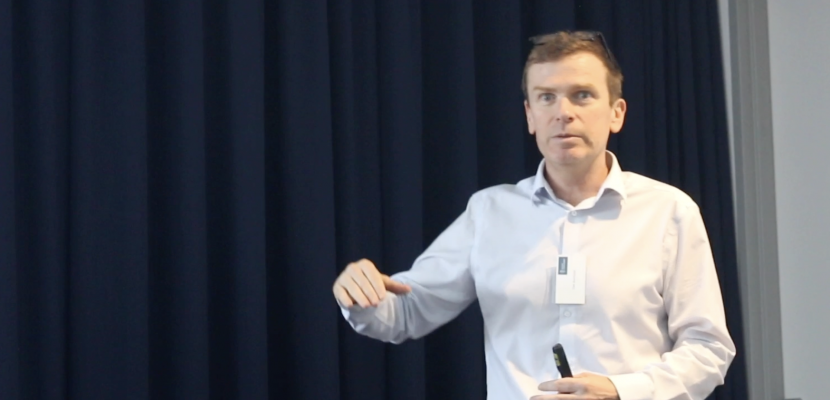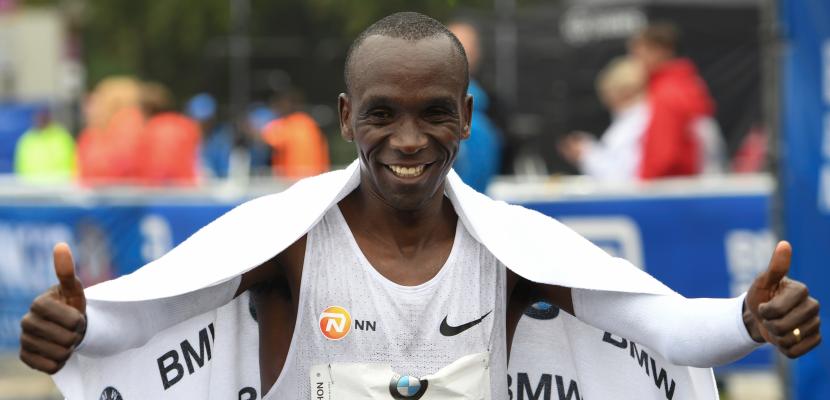
How do you run a marathon distance faster than anyone has ever run one before?
First you find someone willing to fund the project.
Next you find out if the best distance runner in the world is up for the task of running 422 consecutive 100m sprints at an average speed of around 17 seconds each.
And finally, once you get him interested, you call in the best of the best in sports science.
That’s when Tim Kerrison enters the room. Kerrison is one of the most respected high-performance coaches and sports scientists in the world.
He cut his coaching teeth mentoring rowers in Australia and Great Britain before working with British Swimming, Swimming Australia and the Queensland Academy of Sport.
But Kerrison’s involvement in road cycling is what cemented his reputation as a leader in his field.
Between 2012 and 2019 when he was with Team Sky Cycling - later INEOS Grenadiers Cycling - he helped secure an extraordinary seven Tour de France victories. He also had a say in multiple Vuelta a España and Giro d’Italia wins during the same period.
Kerrison visited Bond University last week to offer insights from his long and fascinating career in elite high-performance sport. But of all his achievements, it was one of his more recent projects, the successful Ineos 1:59 Challenge, that had the audience at its most attentive.
The Ineos 1:59 Challenge was a successful 2019 attempt by Kenyan athlete Eliud Kipchoge to break the two-hour mark for running the marathon distance. The event was created specifically for Kipchoge and held in Vienna, Austria, on October 12, 2019.
The idea to mount an attempt at a sub-two-hour marathon grew out of chance meeting in Monaco with British billionaire Jim Ratcliffe. On a rare day off from team duties, Kerrison tagged along with Ratcliffe and Ratcliffe’s son, both keen cyclists, on a social ride. Turns out all three men had a mutual interest in human feats of endurance. They chatted about Eliud Kipchoge’s failed attempt at a sub-two-hour marathon with Nike in 2017. Kerrison casually let slip that there were a few things he might have done differently if he was at the helm.
He didn’t know it at the time, but a plan was percolating.
“Two days later I received an email inviting me to meet with Eliud Kipchoge in Jim Ratcliffe’s office,” Kerrison recounted. “I’d heard these guys were movers and shakers who got things done. Turns out everything I’d heard was absolutely true.”
Less than eighteen months later, Kipchoge ran through crisp Vienna morning air to clock an unbelievable 1:59:40.
It’s a mind-boggling athletic achievement. It was also an extraordinary logistical feat, and one that Kerrison enjoyed especially because it allowed him to apply elements of all he had learned over an extensive career.
“I made a decision very early on in my coaching not to be an expert in any one thing,” he said. “I just needed to know enough about each of the areas involved to be useful on race day as leader of the Performance Control Centre.”
Despite the high stakes, Kerrison described it as a straightforward role.
Until it wasn’t.

“It’s actually the easiest job in the world until you have to make a quick decision,” he said. “On race day I had to make two. One I got right, and the other I got wrong.”
The one Kerrison got right involved fixing a technical issue with the timing system on the fly.
The one he got wrong was far less intrinsic, but important in its own way.
It all had to do with the critical last few kilometres of the run.
The team had various contingencies in place for the closing stages.
“We had Plans A, B and C ready to roll,” Kerrison said. “But when a voice came down the radio asking for a Plan D, all I could say was ‘um, we don’t have one’!”
Plan D involved Kipchoge running solo, free of support runners and without the support vehicle that had accompanied his run from the get-go.
“I knew we could get the car off the road safely, and Eliud was moving well, so I naturally made the decision to give Eliud what he wanted.”
But as keen observers of the coverage of the run would note, that decision came at a cost. Turns out the broadcast camera live streaming the historic moment was mounted on the back of the car Kipchoge wanted gone.
“If you watch the broadcast of the last moments, it’s this weird wobbly distant shot,” Kerrison lamented.
Turns out as a broadcaster Kerrison made a great sports scientist.
But in the end, an inconsequential blip on an extraordinary career in high performance.

